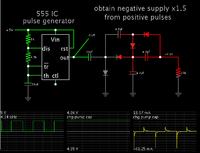anandpv2009
Advanced Member level 1

@Gorgon it depends.
If simultaneous RX/TX is not required, there is nothing wrong in using bit banging C code (Timer delay or CPU delay). Disabling hardware UART interrupt is not even required if the Rx stream is a response of Tx command/data. Of course, INT0 or other random interrupts may cause errors.
@adwnis123
If timing is crucial in your application then.
1. Like Gorgon and others suggested use additional chip.
2. Change the controller as FVM suggested (I prefer this, since your application demand is achievable without additional hardware).
If timing isn't that crucial ie., tx and rx operations of one of the UARTs is predictable or originated within the controller (Rx stream as response of Tx command/data) + no other interrupts are using, go for soft uart (bit banging code - timer or cpu delay). From your previous posts I assume soft uart will be enough for your application.
If simultaneous RX/TX is not required, there is nothing wrong in using bit banging C code (Timer delay or CPU delay). Disabling hardware UART interrupt is not even required if the Rx stream is a response of Tx command/data. Of course, INT0 or other random interrupts may cause errors.
@adwnis123
If timing is crucial in your application then.
1. Like Gorgon and others suggested use additional chip.
2. Change the controller as FVM suggested (I prefer this, since your application demand is achievable without additional hardware).
If timing isn't that crucial ie., tx and rx operations of one of the UARTs is predictable or originated within the controller (Rx stream as response of Tx command/data) + no other interrupts are using, go for soft uart (bit banging code - timer or cpu delay). From your previous posts I assume soft uart will be enough for your application.




